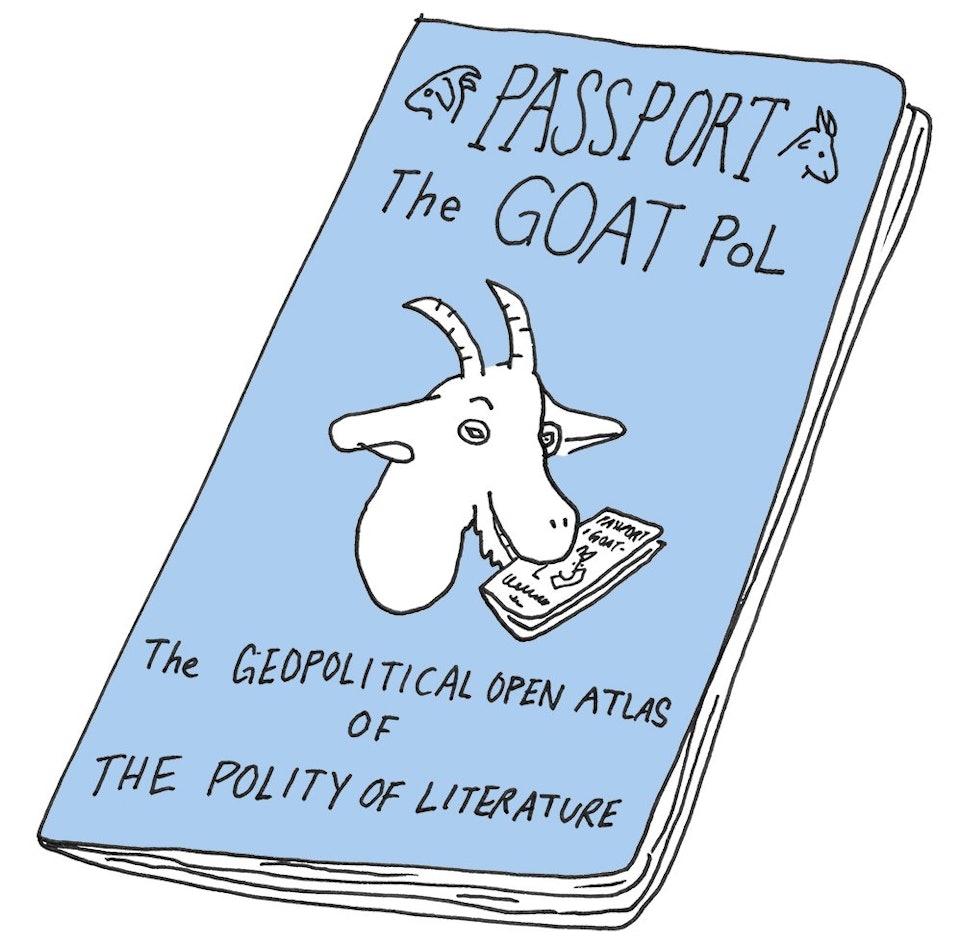Featured Organization
The GOAT PoL
Canada/Worldwide

Polity is a word typically used to categorize organizations and structures within a society. However, The Geopolitical Open Atlas of The Polity of Literature (The GOAT PoL) explores the notion of literature itself serving as a polity, a uniting force for those rejected by the state. As opposed to labeling marginalized groups as “other,” it is their belief that the shared space of literature transcends that of physical borders, war, poverty, and civil strife. The disenfranchised—oppressed ethnic and religious groups, low-income individuals, prisoners, migrants, and those displaced by war—who find themselves unwelcome in their home nations and the nations in which they seek refuge, can find sanctuary at The GOAT PoL.
After experiencing statelessness and surviving the Dutch refugee and asylum system, Matthew Stadler, advisor and editor at The GOAT PoL, conceived of the series “The Polity of Literature.” The 50-essay inquiry is featured on the arts website, ArtsEverywhere, and dissects the relationship between literature and polity. Throughout the series, the forty-plus writers and artists–—including Moones Mansoubi, Ahmet Altan, Harry Gamboa jr., Bettina Aptheker, Simon(e) van Saarloos, Anna Poletti, Anne Focke, Fred Dewey, Robert Glück, and others—selected by Stadler and commissioned by the Musagetes Foundation, reflect on the belief that when people feel dispossessed or estranged by the state, they can still find agency and politics through a “profane citizenship” by writing and reading together in a “polity of literature.” Editing the series, Stadler met and worked with Niels Bekkema, Parwana Amiri, Alison Turner, Audrey Simango, and Arash Hampay, who became the Readers/Advisors/Editors (RAEs) for The GOAT PoL. This marked the beginning of The GOAT PoL’s mission to serve as a territory made of writing and reading together.

The GOAT PoL welcomes any writer, disenfranchised or otherwise, to submit their stories. The writers can submit any piece of writing they choose as each piece undergoes an editorial process before being published. Each and every writer receives equitable compensation for their labor, labor that enables their collective polity of literature to exist and persist. The GOAT PoL is firm in its stance that writers own their texts and that they have the option to publish their work elsewhere. The non-exclusive rights contract is a crucial part of the polity of literature as the organization strives to amplify the voices of writers around the world whose freedom of expression is stifled by oppressive systems and perilous circumstances. As such, each story The GOAT PoL works on becomes a unique site of the polity’s collective work.
As of this writing there are nine active RAEs—Matthew Stadler, Niels Bekkema, Parwana Amiri, Alison Turner, Kate Veiria, Izra Rosario, Audrey Simango, Louis Lüthi, and Moseka Phiona—working variously in North America, Europe, and Africa. The RAEs provide dedicated and informed one-on-one editorial support, from working on a story and publishing a writer’s work for a global audience to completing and publishing writers’ full-length books. The RAEs publishing services have allowed disenfranchised writers to connect with other support systems, including Artists at Risk Connection. According to Stadler, “At the most fundamental level, The GOAT PoL enacts (and offers) [writers] the conditions of equality in a collective that constitute a living polity, so that those expelled or excluded from the state can find their agency and belonging with The GOAT PoL.”

The vast array of work published globally by The GOAT PoL is featured on the website’s world map. The map has stories pinned representing the growing network of writers contributing their work. The public submissions open and close frequently, depending on when the nine RAEs are available to take on new writers. Writers waiting to submit are encouraged to read published work in the hope that writing and reading alongside others becomes the source of agency and belonging in a polity of literature.
The GOAT PoL offers the chance to read and write together, hoping this will give disenfranchised individuals access to a kind of citizenship. The GOAT PoL fosters a global network of solidarity that unites voices from around the world in a cacophonous chorus of support for human rights and artistic freedom. However, Stadler emphasizes that The GOAT PoL does not identify a separate group called “artists,” because the organization believes that everyone who reads and writes is in the polity of literature and constitutes the polity itself. They may call themselves whatever they wish. The polity aims to support their human collective potential by being political and empowering the stateless, incarcerated, and disenfranchised, regardless of how society labels them. It is a space to offer support, provide recognition, and stand in solidarity with other writers. As Stadler expresses, “The GOAT PoL doesn't help anyone find their agency—it is the site of their agency.”
By Ayesha Ali, September 5, 2023. Ayesha is a rising junior at Rutgers University interning at Artists at Risk Connection. She is majoring in Political Science and minoring in Women’s, Gender, and Sexuality Studies and International and Global Studies.